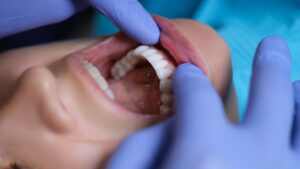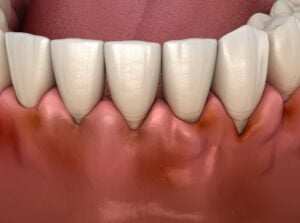-
What Causes Tooth Sensitivity and How to Manage It

Have you ever taken a sip of ice-cold water and felt an unexpected jolt in your teeth? You’re not alone. Tooth sensitivity is a common issue that makes eating, drinking, and even breathing cold air uncomfortable. Most people describe it as a sharp, temporary pain in one or more teeth when exposed to hot or cold temperatures, sweet or acidic foods and drinks, and even pressure from brushing and flossing. Learning what causes tooth sensitivity is the first step toward managing it effectively. Continue reading “What Causes Tooth Sensitivity and How to Manage It”
-
Why You Shouldn’t Ignore Dry Mouth Symptoms

It’s normal for your mouth to feel dry occasionally, such as when you’re dehydrated or nervous, but it shouldn’t feel dry all this time. Chronic dry mouth, or xerostomia, is more than a minor annoyance. It could signal a deeper underlying problem requiring your attention. Plus, it makes you more vulnerable to dental problems. Continue reading “Why You Shouldn’t Ignore Dry Mouth Symptoms”
-
Signs of Oral Cancer
Are You at Risk of Oral Cancer?
The most common form of head and neck cancer, oral cancer affects about 11 people in every 100,000. It is more common in men than in women, in Caucasians than other races, and in older people than younger people. Oral cancer affects the inside of the mouth, and can spread to other areas of your head and neck. It is potentially very dangerous, and has a 63 percent survival rate five years after diagnosis.
 Continue reading “Signs of Oral Cancer”
Continue reading “Signs of Oral Cancer” -
How Diet can Impact your Oral Health
When you eat and drink, what you consume affects the health of your mouth. Interestingly, this is a bidirectional relationship: the health of your mouth also has an impact on the nutrients you consume. Sugary or acidic foods can be harmful to your teeth, while a nutrient-dense diet is beneficial and can actually help prevent gum disease. By making the right choices, you can improve the health of your mouth, which will, in turn, allow you to continue to eat nutritious food.
 Continue reading “How Diet can Impact your Oral Health”
Continue reading “How Diet can Impact your Oral Health” -
8 Tips for Healthy Teeth in 2025

A healthy smile never goes out of fashion. If you’re looking to take better care of your teeth in 2025, follow these eight tips to promote great oral health this year. Continue reading “8 Tips for Healthy Teeth in 2025”
-
Understanding the Stages of Gum Disease: From Gingivitis to Periodontitis
 The Importance of Understanding Gum Disease
The Importance of Understanding Gum DiseaseYou brush, you floss, you limit your sugar consumption, and you see your dentist twice a year. You do all this to avoid cavities and tooth decay, right? Well, yes and no. While tooth decay is a problem for oral health, gum disease is equally concerning. In fact, gum disease, also known as periodontal disease, can become a serious health concern if left unchecked. Continue reading “Understanding the Stages of Gum Disease: From Gingivitis to Periodontitis”
-
Can Probiotics Help with Bad Breath?
 The Problem of Bad Breath
The Problem of Bad BreathBad breath is something that affects everyone from time to time, but for many people, it can become a chronic problem. In fact, bad breath, also called halitosis, ranks just behind cavities and periodontal disease in the list of reasons why people see the dentist. Going to the dentist is a good move, because, while bad breath can be the result of eating food like garlic, it can also be an indicator of oral issues like gum disease, cavities, and dry mouth. Your dentist can help rule these causes out, and may refer you to your primary care physician if there are concerns about health conditions that can cause bad breath, like diabetes or kidney disease. For most people, though, halitosis is caused by a blend of gases produced by mouth bacteria. Understanding that, scientists have begun to focus on using probiotics to help solve the problem of bad breath. Continue reading “Can Probiotics Help with Bad Breath?”
-
The Impact of Stress on Oral Health
 Stress and Your Oral Health
Stress and Your Oral HealthYou probably know that stress can negatively impact your health, with chronic stress manifesting in a wide variety of health conditions. From disturbing your sleep to increasing your risk of heart attack or stroke, the results of poorly managed stress are a problem for your whole body. Did you know that stress also has a negative impact on your oral health? Continue reading “The Impact of Stress on Oral Health”
-
Choosing the Right Toothbrush and Toothpaste
 When it comes to the tools you are choosing to use for your oral hygiene, you want to make sure you select the absolute best. After all, your toothbrush and toothpaste are all you’ve got for cleaning your teeth, mouth, and gums. With so many options available, how do you find the best possible cleaning tools to enhance and clean your beautiful smile? The experts at Park 56 Dental can help you understand what to look for when choosing these important tools. Let’s break it down and examine the criteria you’re looking for.
When it comes to the tools you are choosing to use for your oral hygiene, you want to make sure you select the absolute best. After all, your toothbrush and toothpaste are all you’ve got for cleaning your teeth, mouth, and gums. With so many options available, how do you find the best possible cleaning tools to enhance and clean your beautiful smile? The experts at Park 56 Dental can help you understand what to look for when choosing these important tools. Let’s break it down and examine the criteria you’re looking for.Continue reading “Choosing the Right Toothbrush and Toothpaste”
-
How to Handle Dental Issues When You’re Traveling for the Holidays
 The upcoming holidays are an excellent time to travel, visit family and friends, and relax. But what happens if a dental issue springs up while you’re not at home? This kind of emergency can cause total panic. Are there ways to handle dental issues while you’re traveling? Are there ways to avoid dental problems? Here are some tips on how to handle dental issues while traveling.
The upcoming holidays are an excellent time to travel, visit family and friends, and relax. But what happens if a dental issue springs up while you’re not at home? This kind of emergency can cause total panic. Are there ways to handle dental issues while you’re traveling? Are there ways to avoid dental problems? Here are some tips on how to handle dental issues while traveling.Continue reading “How to Handle Dental Issues When You’re Traveling for the Holidays”
RECENT POSTS
categories
- Uncategorized
- Cosmetic Dentistry
- Veneers
- Healthier Teeth
- Teeth Whitening
- Dental Health
- Video
- Dental Emergencies
- Invisalign
- Dental Implants
- Root Canal
- Sedation Dentistry
- Infographic
- Dental Crowns and Bridges
- Dental Anxiety
- Gum Disease
- COVID-19
- Bad Breath
- New York Dentist
- Cut out sugar
- General Dentistry
- Oral Health
- Oral Cancer
- Dry Mouth
- Gum Health
- Toothache
- Dental Sealants
- Cavities



